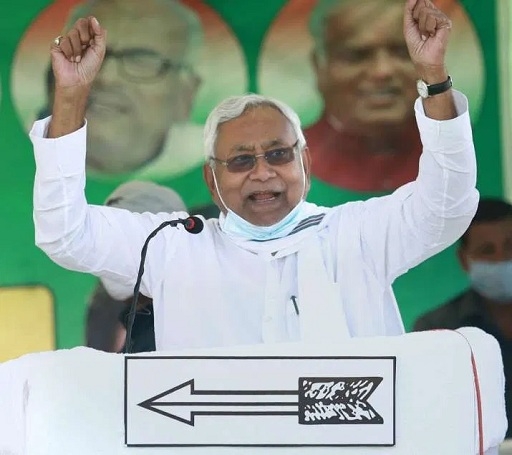Nitish Kumar: Masterful craftsman of realpolitik
| Date :17-Nov-2020 |

PATNA ;
“POLITICS is the art of the possible”, German statesman Otto Von Bismarck once famously said. And who understands it better than Nitish Kumar, the modern-day craftsman of realpolitik, who has survived many a headwind to secure a fourth straight term as the Bihar Chief Minister despite his party finishing a poor third in the 243-member State Assembly. Nitish Kumar’s unusual knack for spotting friends has got him where it has despite the drastic slump in the electoral fortune of his party that won just 43 seats, down from 71 it had in 2015, and 31 less than ally BJP which clinched 74.
The most atypical of politicians owing their rise to post-Mandal politics, Nitish Kumar stood out for his ability to address the governance deficit, unlike a majority of the breed reared in the socialist stable, but was often accused of pursuing politics of opportunism. Call it political opportunism or sagacity, his moves, in effect, prevented the Hindutva forces from holding sway over Bihar, where a section of the BJP feels mortified over not having its own Chief Minister till date despite enjoying a near hegemonic status nationally. Known for weighing his options carefully before making any move, Kumar, upon a closer look, comes across as a risk taker who has not shied away from going against the tide.
An engineer by training who had taken an active part in the JP movement, Kumar spurned a job offer from the State Electricity Department and decided to take the political gamble, an oddity among educated youth in Bihar for whom the lure of “sarkaari naukri” remains undiminished. Unlike Lalu Prasad and Ram Vilas Paswan, his co- travellers during the movement led by Jayaprakash Narayan, electoral success eluded Kumar for long. He got the first taste of victory, after three successive defeats, in the 1985 Assembly polls when he won from Harnaut as a candidate of the Lok Dal though the Congress swept the elections riding the tailwind generated by the assassination of Indira Gandhi the previous year. Four years later he entered the Lok Sabha from Barh even as fellow MP from Saran Lalu Prasad shifted to Bihar, taking over as the Chief Minister and scripting a spectacular success story which altered the State’s political landscape. Kumar, one of the most articulate leaders of the Janata Dal, had fully backed Lalu in the keenly fought internal contest for chief ministership.
The next decade-and-a-half saw Prasad’s rise as one of the most powerful but controversial figures of his time who ruled the State by proxy, getting his demure homemaker wife Rabri Devi elected as his successor, when a charge sheet in fodder scam caused him to step down as the Chief Minister. During the same period, Kumar burnt his bridges with Prasad, floated the Samata Party, and built his own political edifice brick by brick. The Samata Party joined forces with the BJP and Kumar made a mark for himself as an outstanding parliamentarian and was reckoned among the competent ministers in the Atal Behari Vajpayee cabinet.
After a rift between Sharad Yadav, the then Janata Dal president, and Lalu Prasad, the latter broke away and formed the RJD. The Samata Party merged with Sharad Yadav’s Janata Dal while continuing its alliance with the BJP. After the NDA lost power in 2004, a victory in Bihar held out the promise of a degree of redemption for the BJP-led alliance. Attempts to wrest power from the RJD-Congress combine, then in power at the Centre as well, after the NDA fell short of majority in the assembly polls of February, 2005, were stymied by Governor Buta Singh’s controversial move to dissolve the Assembly, without it having even been constituted, in the face of alleged horse trading. This, however, proved a blessing in disguise for Kumar who was projected as the chief ministerial candidate in the elections that took place nine months later and the JD(U)-BJP combine got a comfortable majority, bringing the so-called “Lalu era” to an end. Kumar’s first five years as Chief Minister are recalled with admiration even by critics, marked as these were by vast improvement in law and order, though the new dispensation had no dearth of people with criminal background among its rank and file.